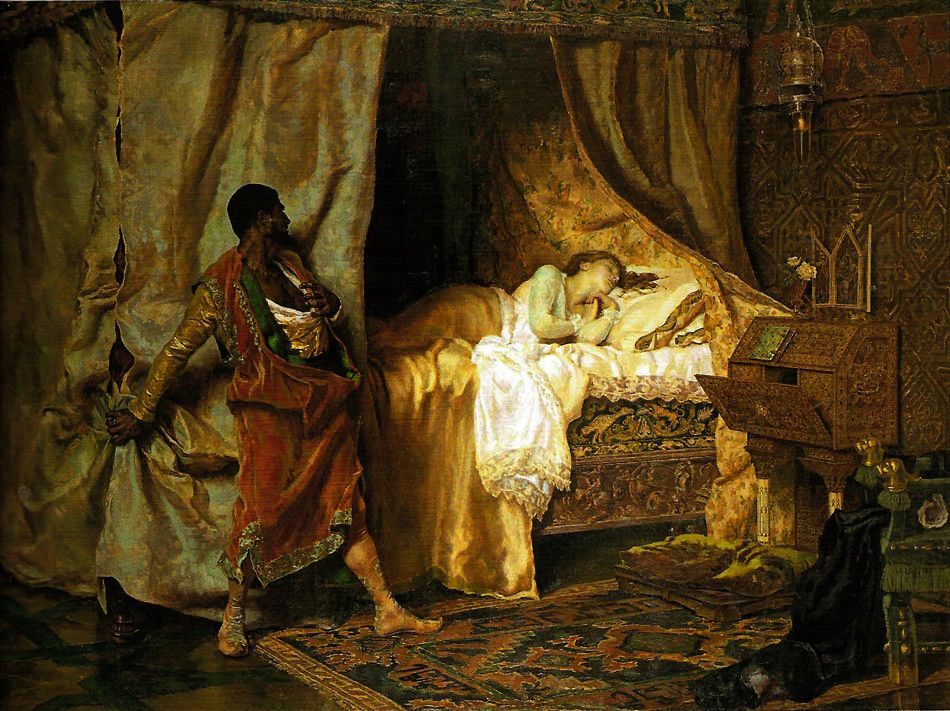I am often asked what’s my favorite Shakespeare play. It’s like asking me to pick my favorite ice cream. Sure, there are favs, but it’s ice cream – the worst I’ve had is terrific. Having performed about two-thirds of the canon, any list of mine would have Much Ado and Twelfth Night at the top, alongside R&J, R3, and Mackers, because they’re fun to do. But it often depends upon the day, and my mood.
A much easier question to answer is what is my favorite moment in Shakespeare. There are only a handful, because I lean towards the heart-breaking. Juliet’s line to dead Romeo: “Thy lips are warm.” Kent holding dead Lear: “Vex not his ghost. O, let him pass.”
But the one that kills me every time is from Othello. Perversely, it’s a line that is almost always cut in performance.
By Act V, Othello is utterly convinced that his faithful wife is anything but, that she has been carrying on with his young lieutenant, Cassio. But he still loves her – if he did not he could not be so passionately moved. So, though he has resolved to kill her, he first must make certain she has prayed:
OTHELLO Have you pray’d tonight, Desdemona?
DESDEMONA Ay, my lord.
OTHELLO If you bethink yourself of any crime
Unreconciled as yet to heaven and grace,
Solicit for it straight.
DESDEMONA Alas, my lord, what do you mean by that?
OTHELLO Well, do it, and be brief; I will walk by:
I would not kill thy unprepared spirit;
No; heaven forfend! I would not kill thy soul.
DESDEMONA Talk you of killing?
OTHELLO Ay, I do.
DESDEMONA Then heaven
Have mercy on me!
OTHELLO Amen, with all my heart!
Why does Othello care if she prayed? Elizabethan tradition held that a prayer before dying will cleanse the soul, sending it to Heaven. It’s actually a rather Lutheran belief, not needing a priest to intercede between penitent and God. This same belief stops Hamlet from murdering his uncle while Claudius is bent in prayer.
Here, Othello is making sure that, though she must die, Desdemona’s soul will go to paradise. While his rage demands her death, his love demands her soul be saved.
Assured her soul is not in jeopardy, Othello kills his wife, smothering her with a pillow. Like so many Shakespearean characters, however, she must talk after she is murdered. Mercutio does this, and Paris, and Edmund, and young Macduff, and so on. Slain, they get to speak their last.
So, too, does Desdemona. Her maid Emilia rushes into the room and kneels beside her dying mistress, while Othello looks on:
EMILIA Out, and alas! that was my lady’s voice.
Help! help, ho! help! O lady, speak again!
Sweet Desdemona! O sweet mistress, speak!
DESDEMONA A guiltless death I die.
EMILIA O, who hath done this deed?
DESDEMONA Nobody; I myself. Farewell.
Commend me to my kind lord: O, farewell!
That! That right there is my favorite line in Shakespeare! “Nobody; I myself.”
Desdemona loves Othello so much, so deeply and truly, that even as she’s dying she tells this lie for him. Her love is deeper than Othello’s, because it can forgive anything – even her own murder.
Here’s why this moment wreaks havoc on me. By saying she did it, she is telling a lie. Thus committing a sin. Thus damning her soul to Hell to protect the man who just murdered her. Desdemona willingly condemns herself to eternal damnation to save Othello. It’s so awfully, wonderfully Tragic I can hardly breathe.
As I mentioned, this moment is hardly ever staged. It’s too hard, or too funny, to have a murdered woman talk. But staged properly, it has all the more power, because it shows the depth of the love Othello has just cast away.
It’s my favorite moment in all of Shakespeare. It hurts so much that it is beautiful.


